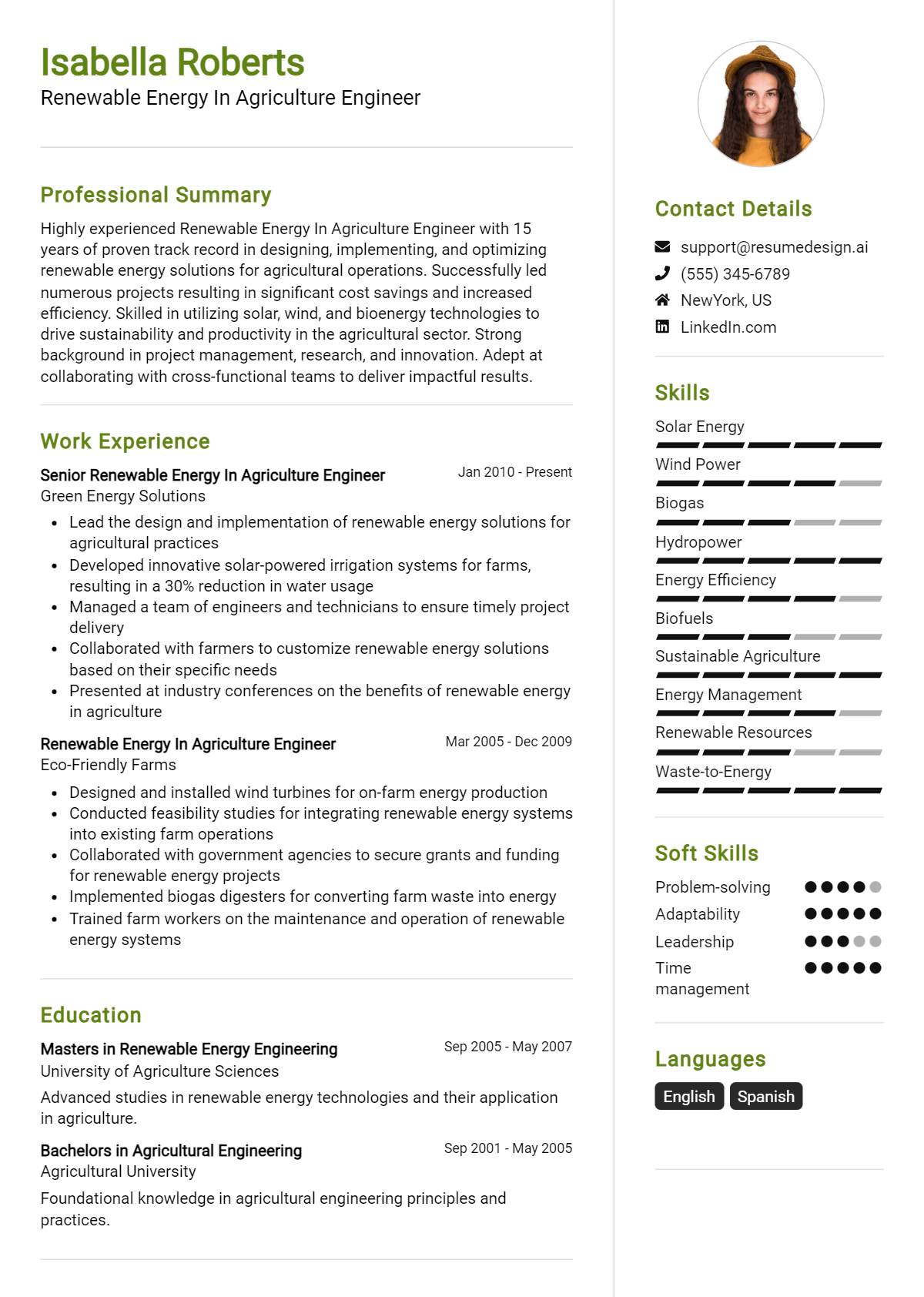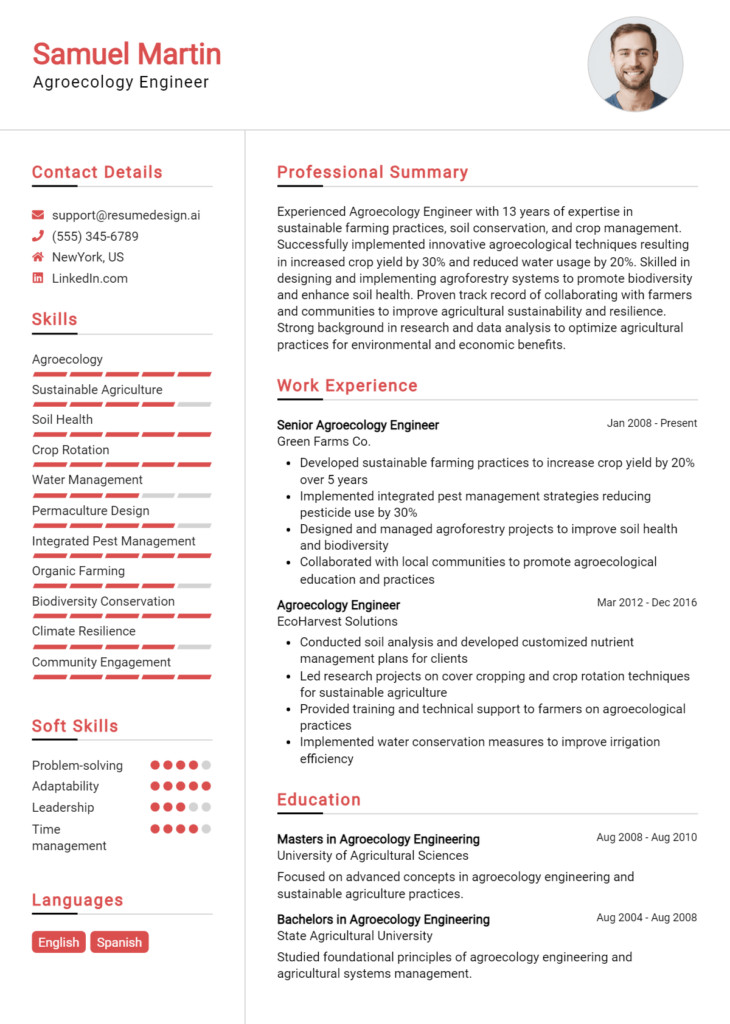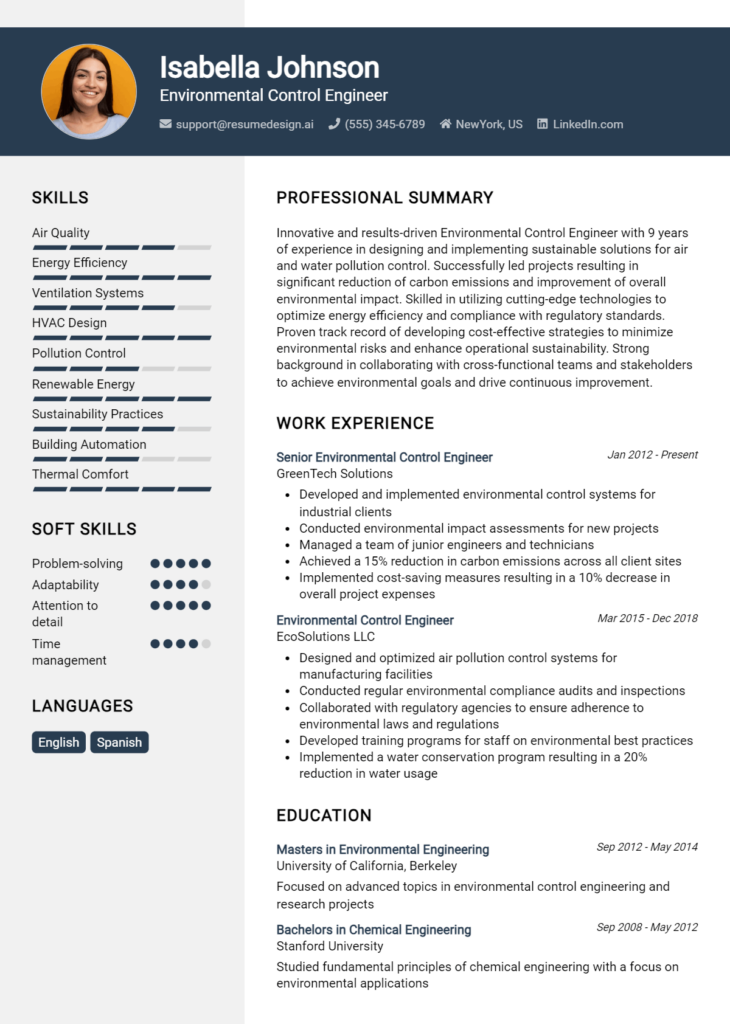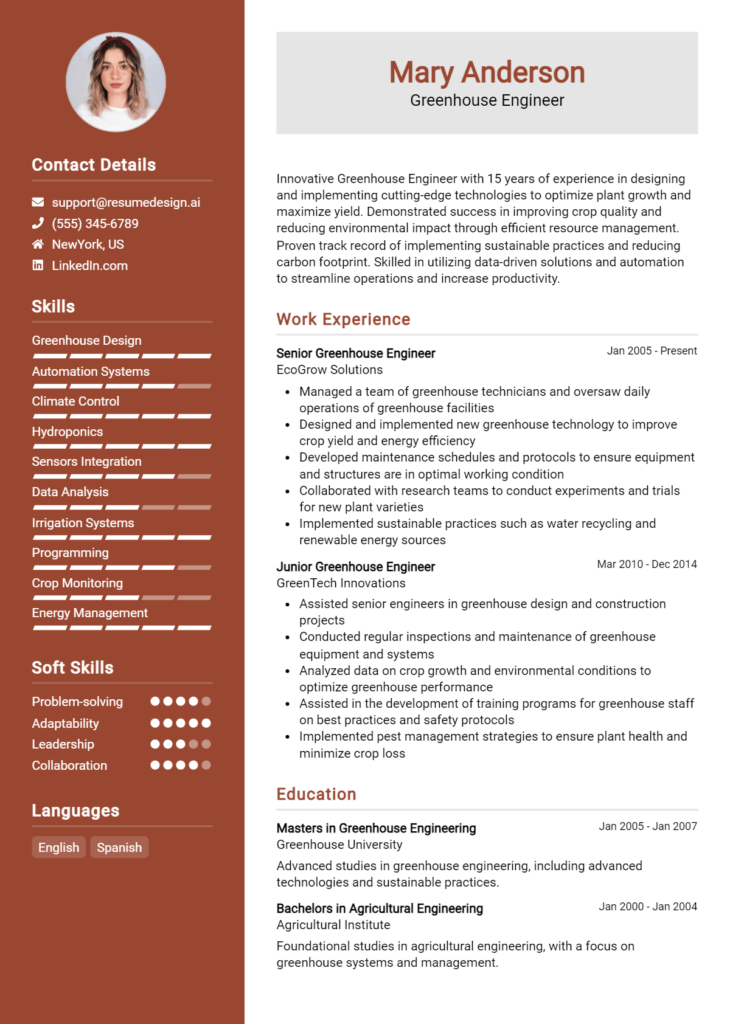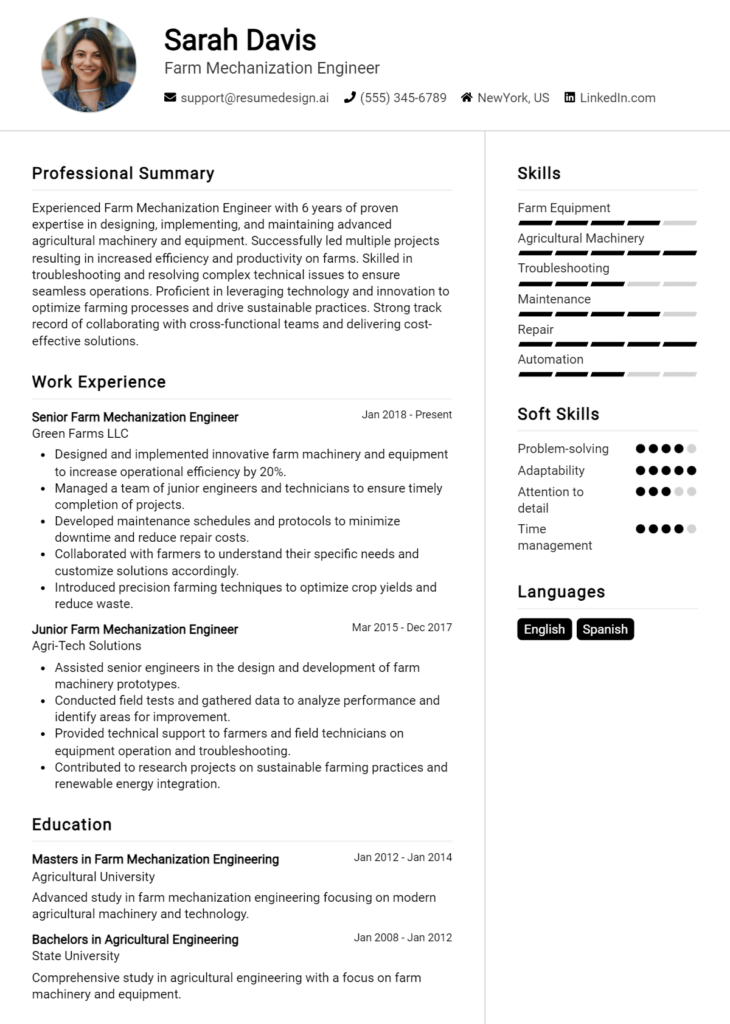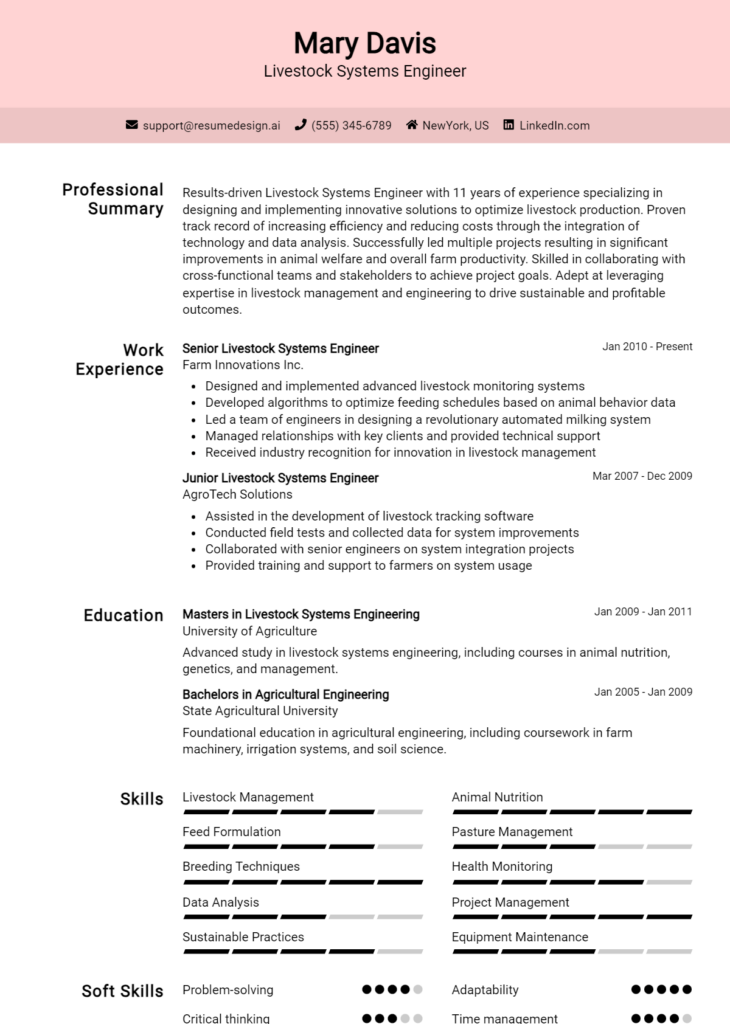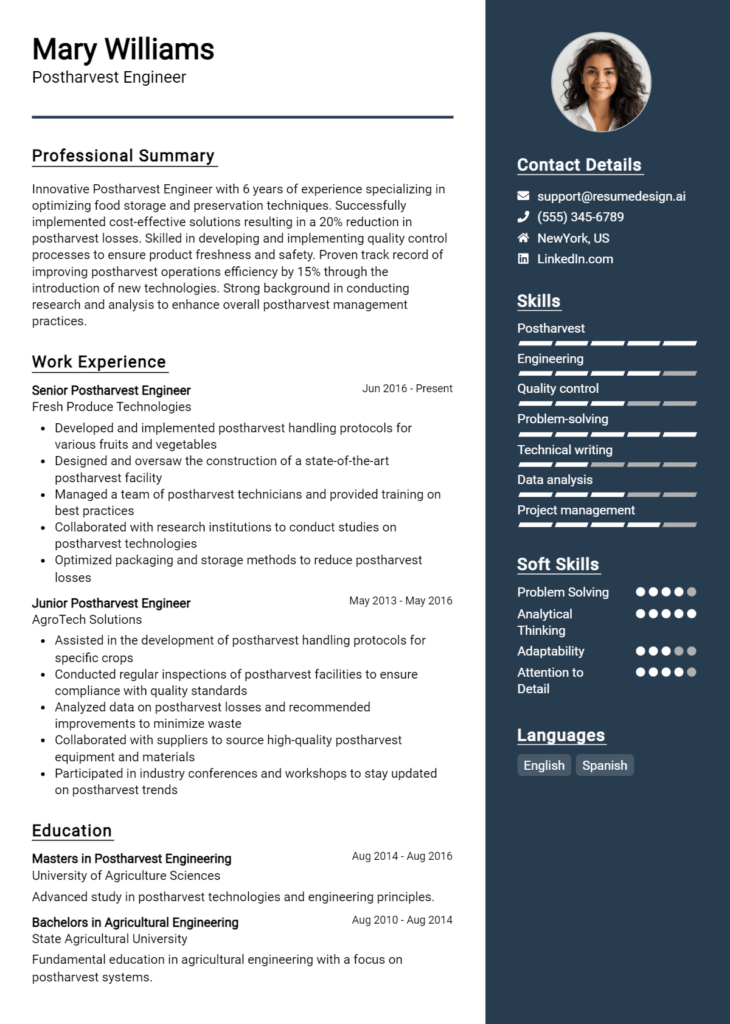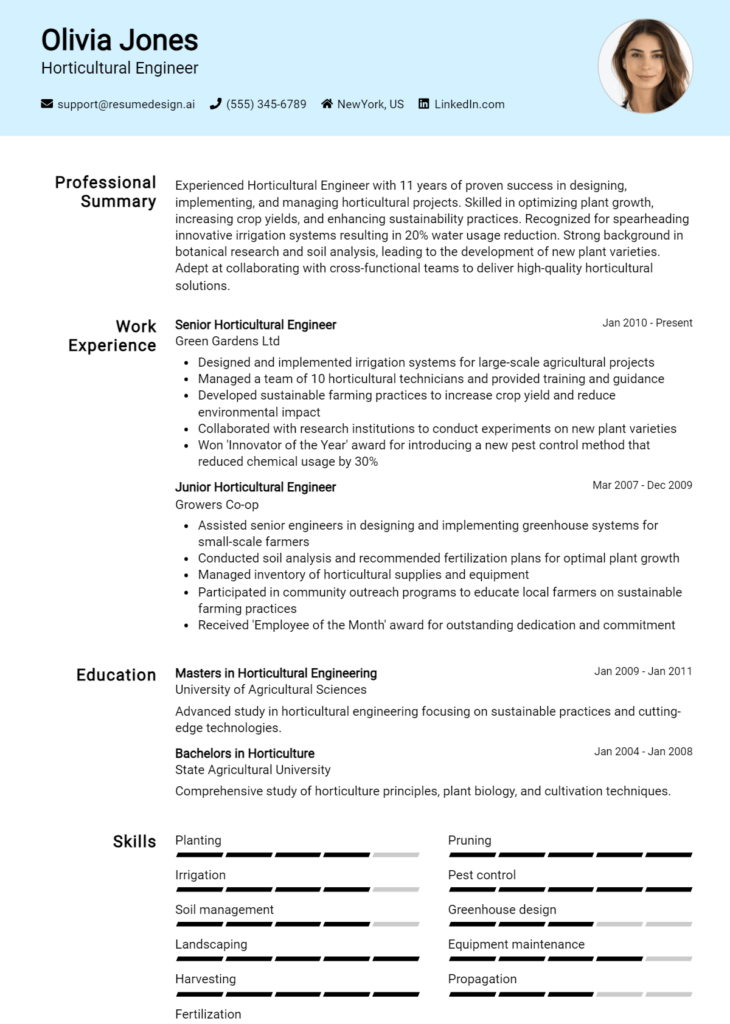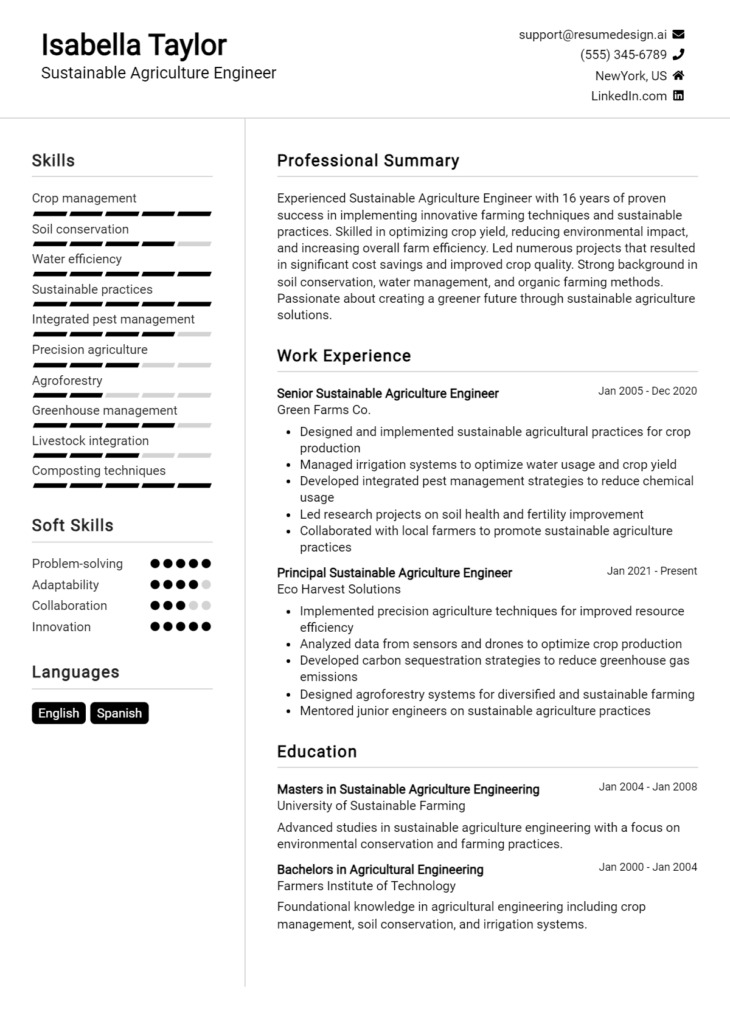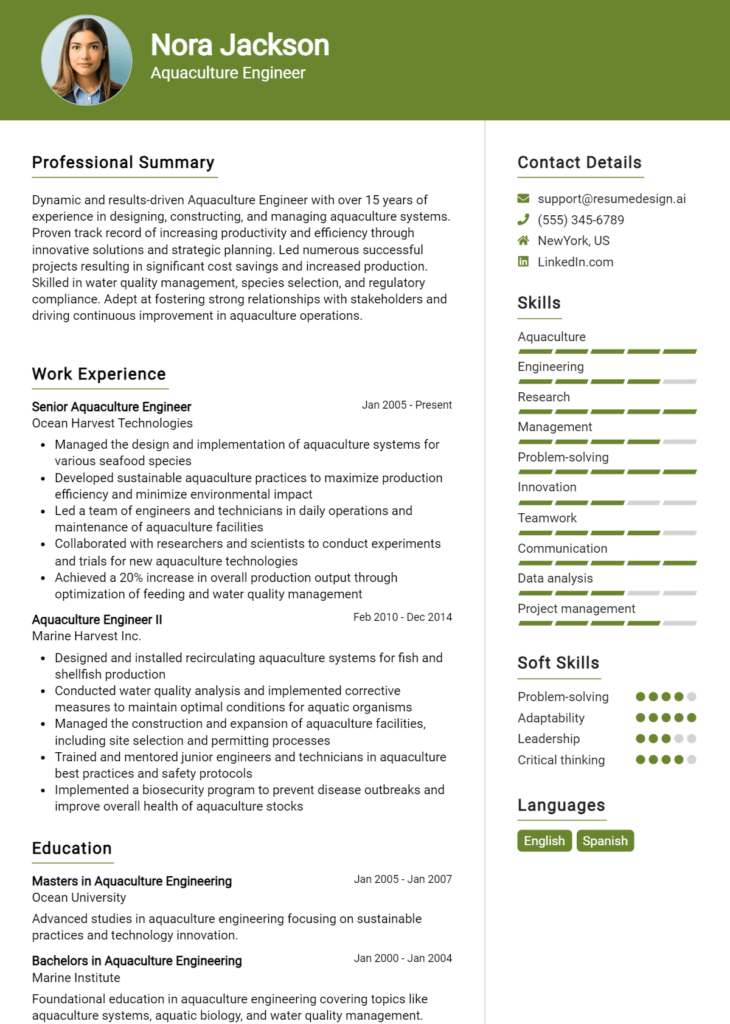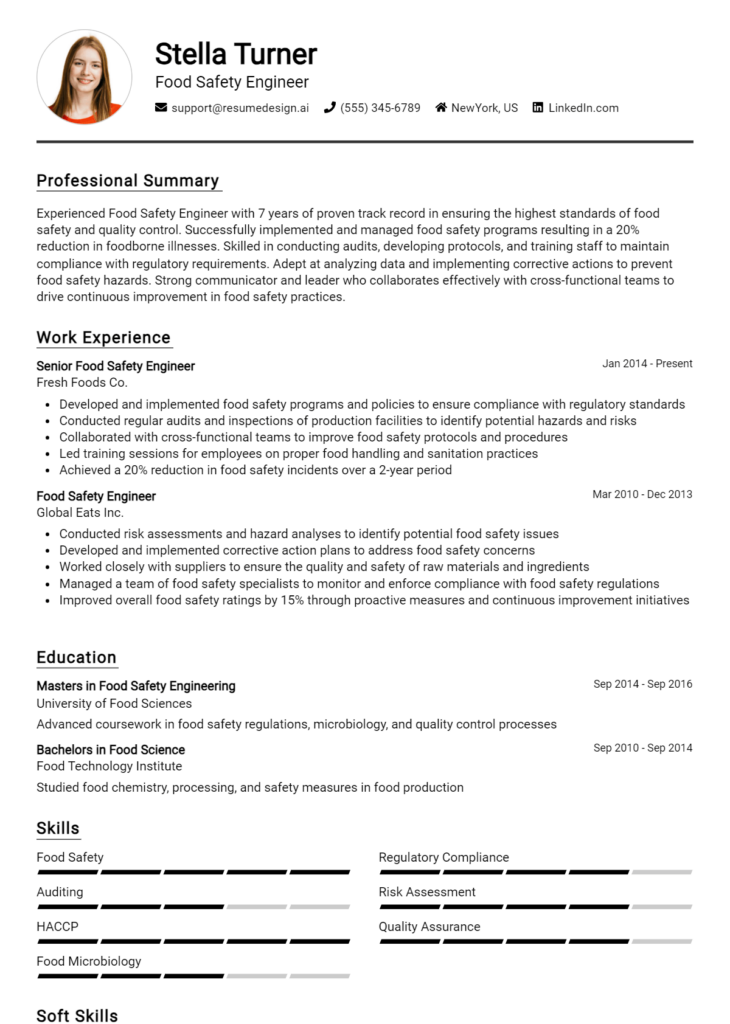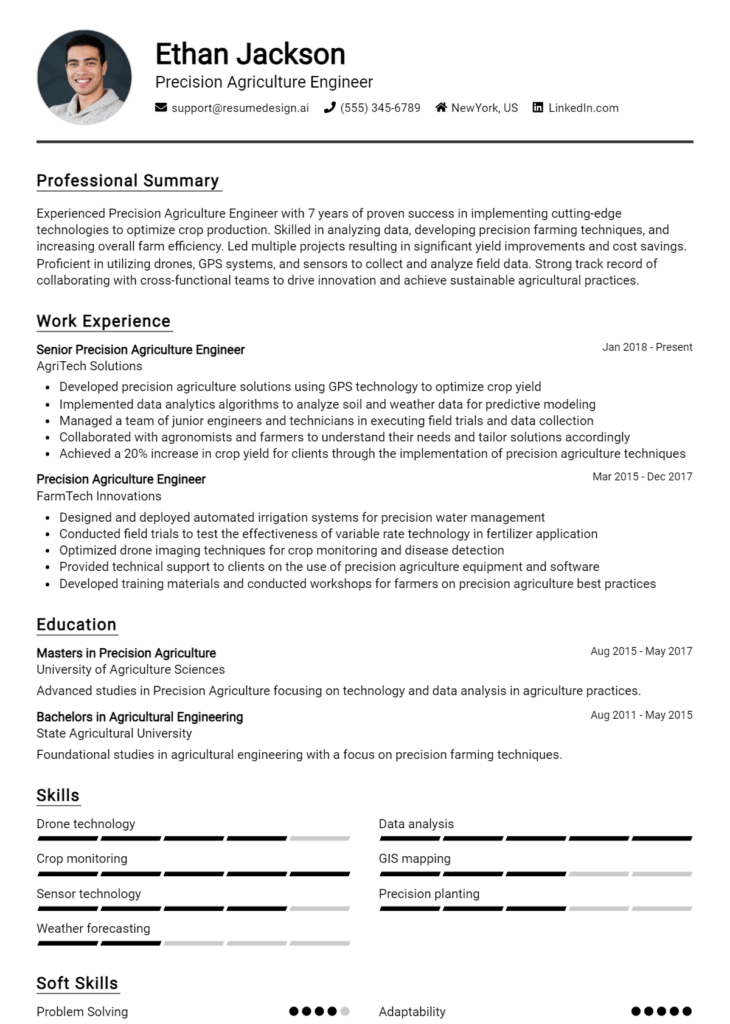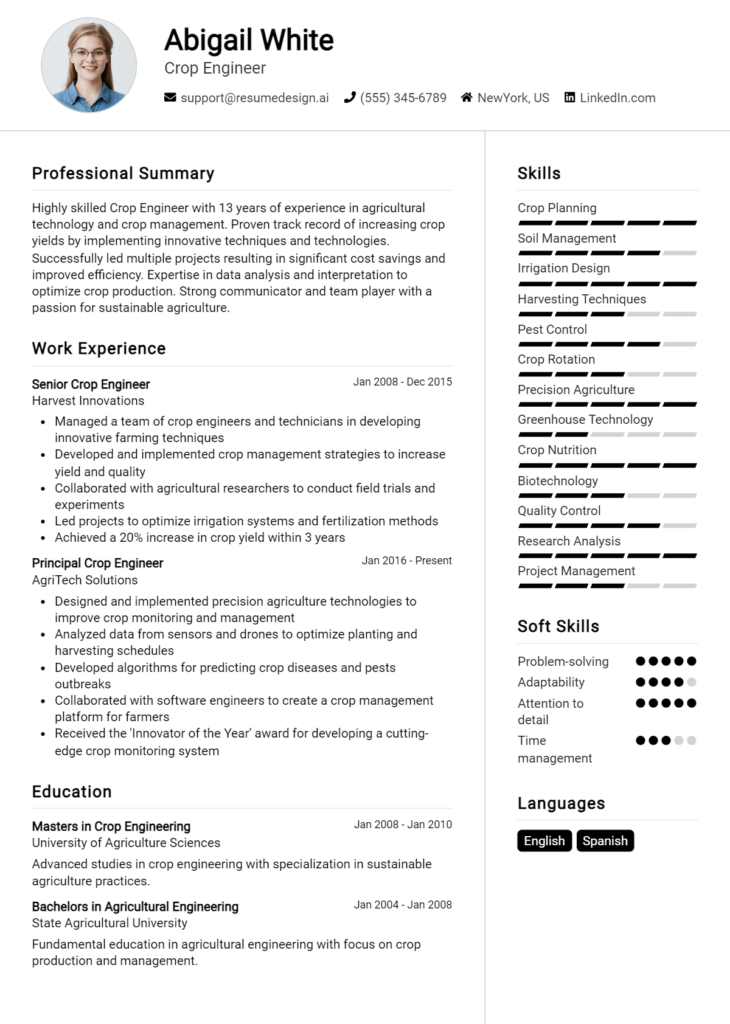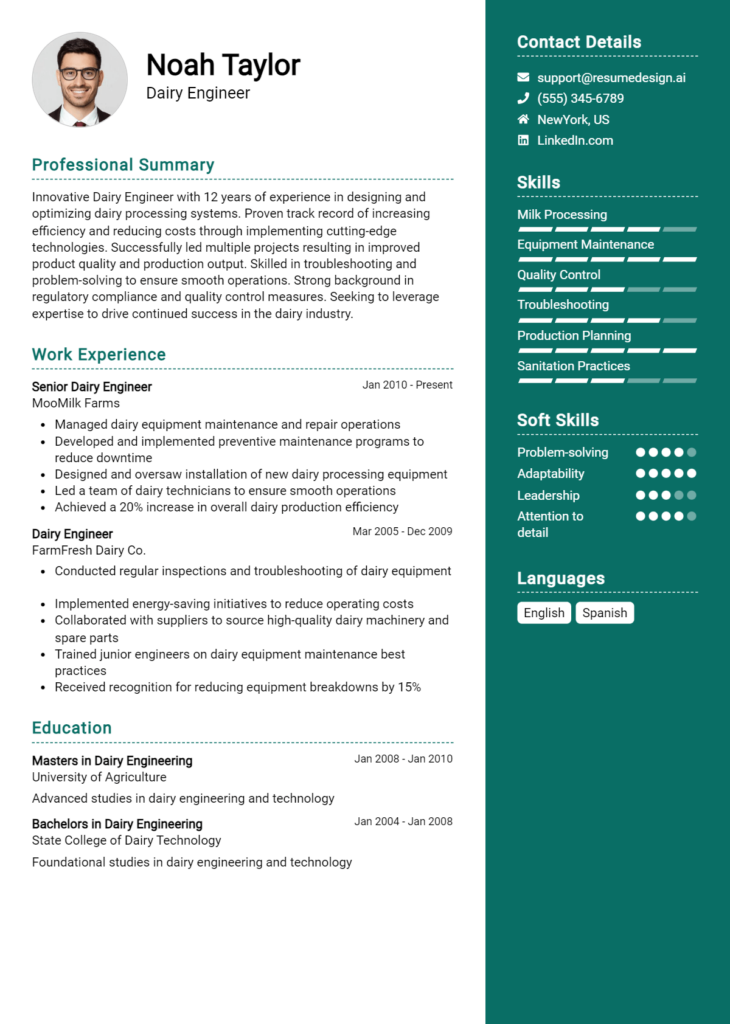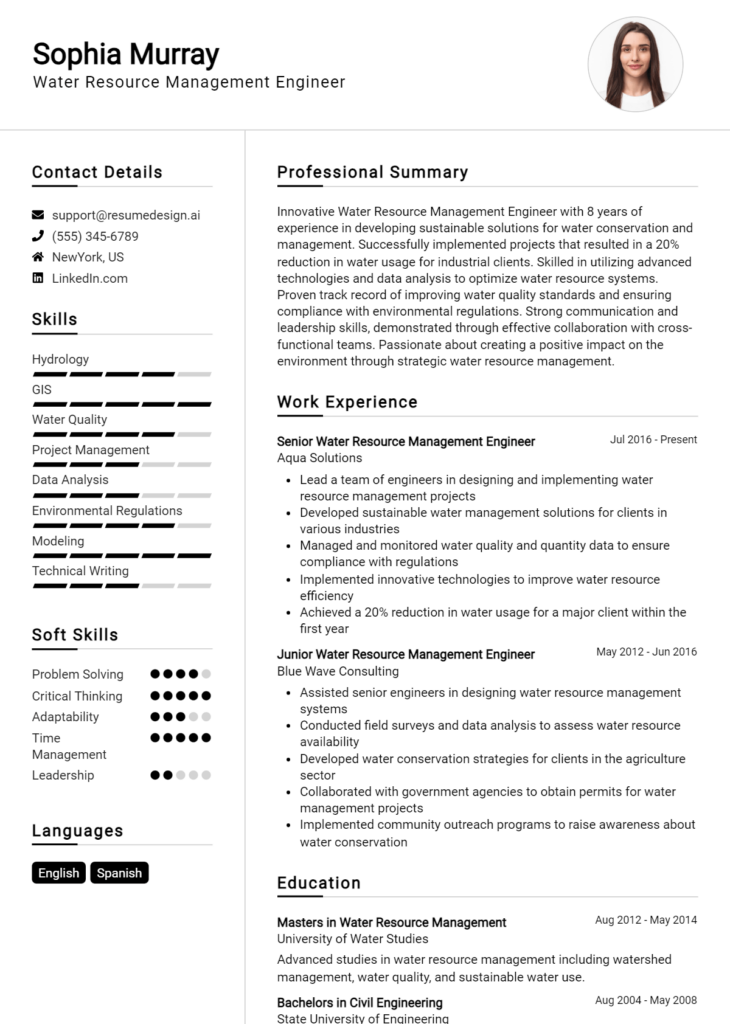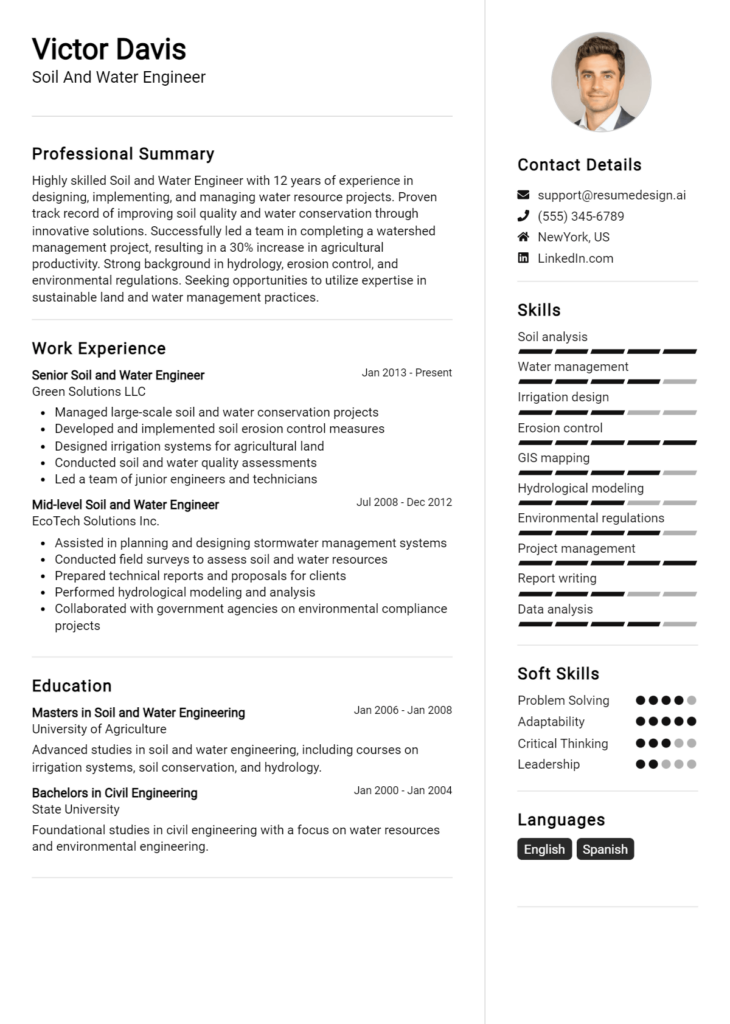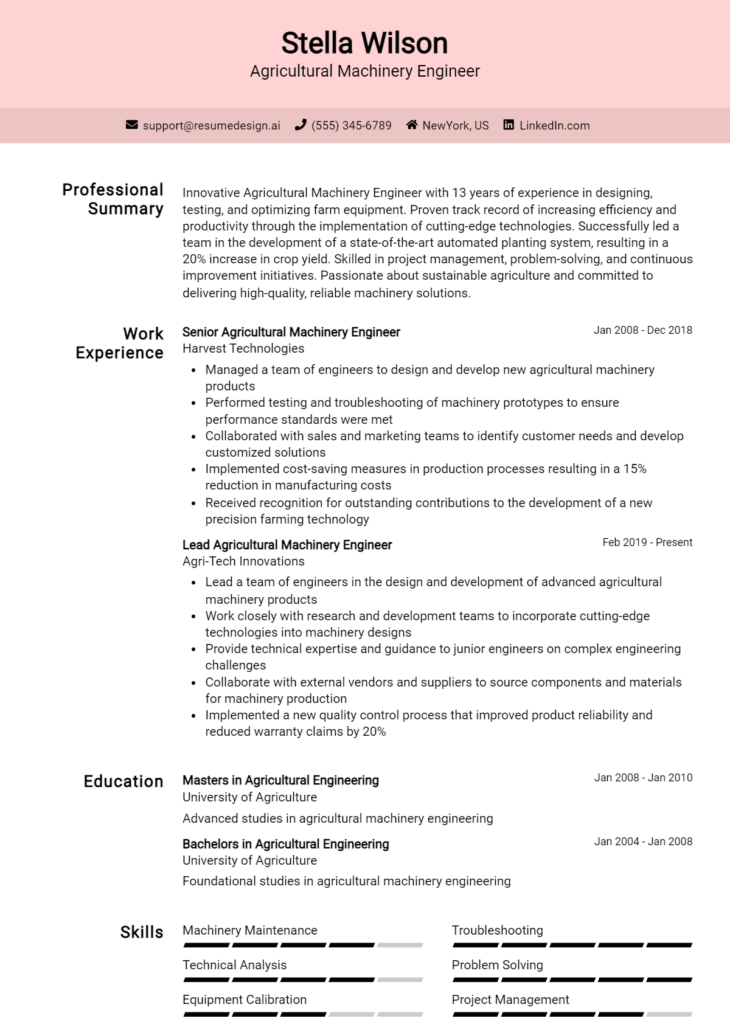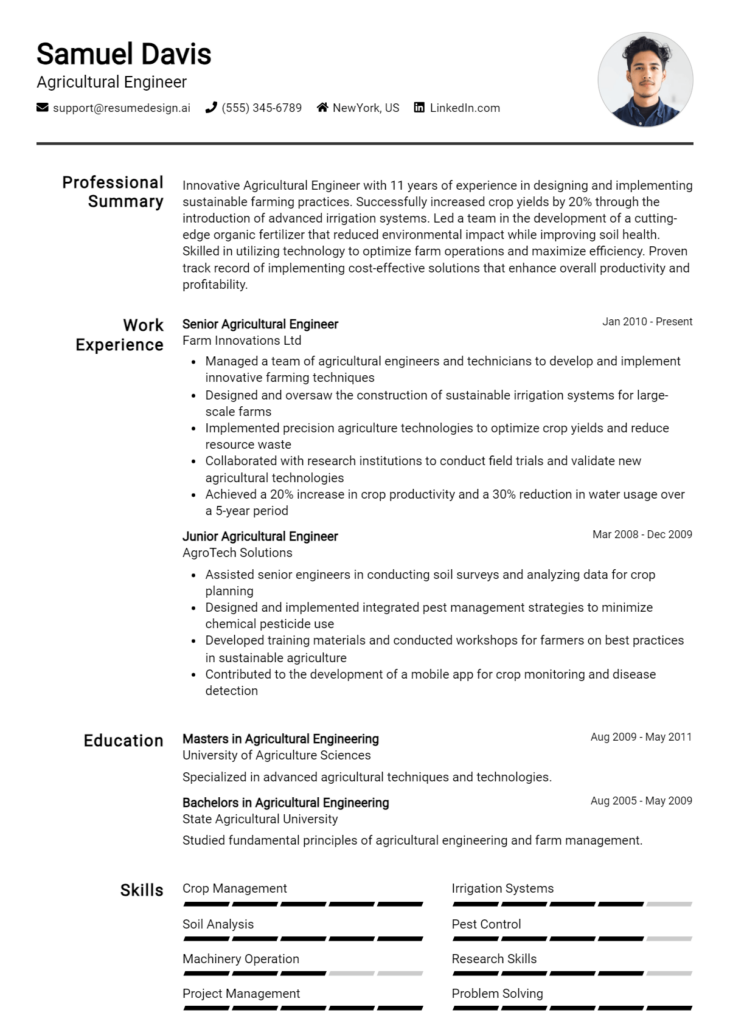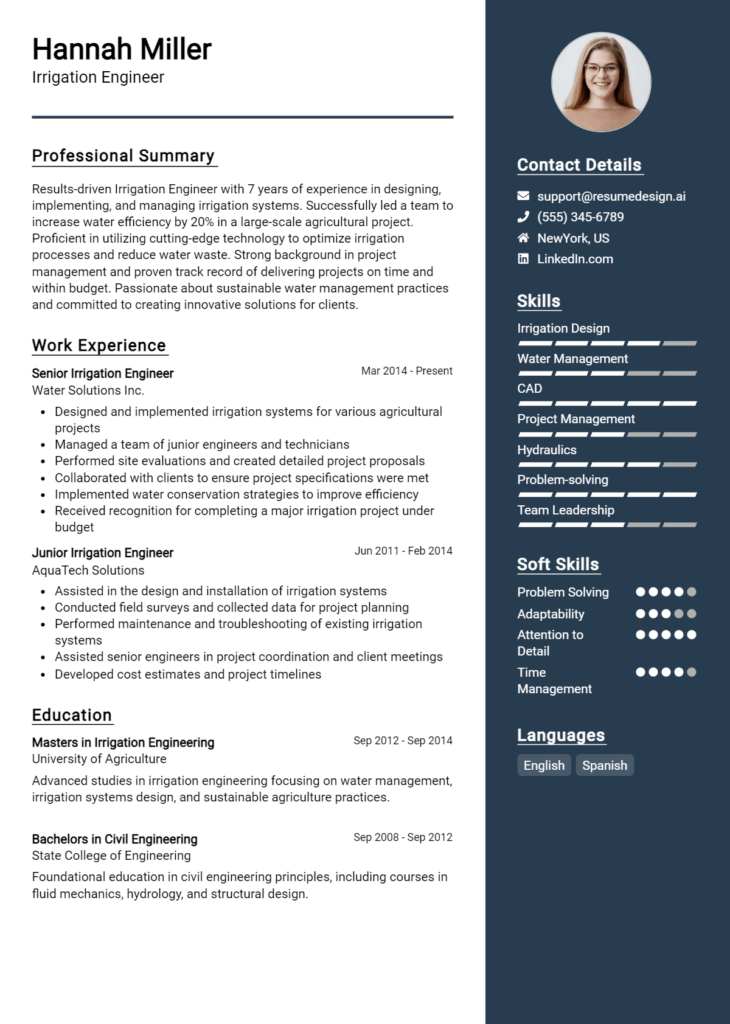Renewable Energy in Agriculture Engineer Core Responsibilities
A Renewable Energy in Agriculture Engineer plays a vital role in integrating sustainable energy solutions within agricultural practices. Key responsibilities include designing and implementing renewable energy systems, conducting feasibility studies, and collaborating with agronomists and environmental scientists. Essential skills encompass technical proficiency in energy systems, operational management, and strong problem-solving abilities. These competencies are crucial for meeting organizational goals, and a well-structured resume can effectively highlight these qualifications, showcasing the candidate’s ability to bridge departments and drive innovation.
Common Responsibilities Listed on Renewable Energy in Agriculture Engineer Resume
- Design and implement renewable energy systems for agricultural applications.
- Conduct feasibility studies and cost-benefit analyses for energy projects.
- Collaborate with multidisciplinary teams including agronomists and engineers.
- Monitor and evaluate the performance of renewable energy installations.
- Develop strategies for energy efficiency and conservation in farming practices.
- Ensure compliance with environmental regulations and standards.
- Conduct research on emerging technologies in renewable energy.
- Provide training and support to agricultural staff on new energy practices.
- Prepare detailed reports and presentations on project outcomes.
- Identify funding opportunities and assist in grant applications.
- Engage with stakeholders to promote sustainable energy initiatives.
- Stay updated on industry trends and advancements in renewable energy.
High-Level Resume Tips for Renewable Energy in Agriculture Engineer Professionals
In the rapidly evolving field of Renewable Energy in Agriculture Engineering, a well-crafted resume is crucial for standing out in a competitive job market. Your resume is often the first impression you make on potential employers, serving as a powerful tool to showcase your skills, achievements, and passion for sustainable practices. It needs to clearly reflect your specialized knowledge in renewable energy systems, agricultural technologies, and environmental stewardship. This guide will provide practical and actionable resume tips specifically tailored for professionals in the Renewable Energy in Agriculture Engineer sector, helping you create a document that truly represents your capabilities and sets you apart from the crowd.
Top Resume Tips for Renewable Energy in Agriculture Engineer Professionals
- Tailor your resume to each job description by incorporating keywords and phrases that align with the specific role you are applying for.
- Highlight relevant experience in renewable energy projects, agricultural engineering, or sustainability initiatives to demonstrate your expertise.
- Quantify your achievements using metrics, such as energy savings, efficiency improvements, or project budgets, to provide concrete evidence of your impact.
- Showcase industry-specific skills, such as knowledge of solar energy systems, wind technology, bioenergy, and sustainable farming practices.
- Include certifications or additional training related to renewable energy or agricultural engineering to enhance your qualifications.
- Utilize a clear and professional format, ensuring that your resume is easy to read and visually appealing, with well-defined sections for experience and education.
- Incorporate a summary statement that encapsulates your professional background, career goals, and what you bring to the role.
- Use action verbs to describe your responsibilities and achievements, making your contributions more dynamic and impactful.
- Maintain a focus on sustainability and innovation throughout your resume, emphasizing how you can contribute to the advancement of green technologies in agriculture.
By implementing these tips, you can significantly increase your chances of landing a job in the Renewable Energy in Agriculture Engineer field. A polished and targeted resume not only highlights your qualifications but also communicates your commitment to sustainable practices and your readiness to take on challenges in this vital sector. Take the time to refine your resume, and you will position yourself as a strong candidate ready to make a difference in the industry.
Why Resume Headlines & Titles are Important for Renewable Energy in Agriculture Engineer
In the competitive field of renewable energy in agriculture engineering, a well-crafted resume headline or title plays a pivotal role in capturing the attention of hiring managers. A strong headline can serve as a succinct summary of a candidate's key qualifications, providing an immediate insight into their expertise and relevance to the position. It should encapsulate the essence of the applicant's professional identity in a compelling phrase, making it easier for hiring managers to discern the candidate's fit for the role at a glance. By being concise, relevant, and directly aligned with the job being applied for, an effective resume headline can set the tone for the entire application and increase the chances of landing an interview.
Best Practices for Crafting Resume Headlines for Renewable Energy in Agriculture Engineer
- Be concise: Keep the headline to one impactful phrase.
- Be specific: Use industry-relevant language and terminology.
- Highlight key strengths: Focus on skills, experience, or accomplishments.
- Align with job description: Tailor the headline to reflect the job requirements.
- Use action words: Start with strong verbs to convey proactivity.
- Avoid jargon: Ensure clarity and accessibility for all readers.
- Emphasize results: If possible, hint at measurable achievements.
- Stay professional: Maintain a formal tone appropriate for the industry.
Example Resume Headlines for Renewable Energy in Agriculture Engineer
Strong Resume Headlines
Innovative Renewable Energy Engineer Specializing in Sustainable Agricultural Solutions
Experienced Agricultural Engineer with a Proven Track Record in Solar Energy Integration
Results-Driven Professional Focused on Enhancing Crop Yields through Renewable Technologies
Weak Resume Headlines
Engineer Looking for Jobs
Renewable Energy Professional
The strong headlines are effective because they clearly communicate the candidate's specific expertise and achievements in the field of renewable energy in agriculture engineering. They engage the reader by showcasing relevant skills and providing a glimpse of the candidate's potential contributions. On the other hand, the weak headlines fail to impress due to their vagueness and lack of specificity; they do not convey any unique qualifications or compelling reasons for hiring managers to consider the candidate further. In a field where innovation and specialization are key, generic titles simply do not stand out.
Writing an Exceptional Renewable Energy in Agriculture Engineer Resume Summary
A resume summary is a critical component for a Renewable Energy in Agriculture Engineer, as it serves as a snapshot of a candidate's qualifications and expertise. This brief yet impactful introduction allows hiring managers to quickly assess whether a candidate possesses the essential skills, experience, and accomplishments relevant to the position. A strong summary not only grabs attention but also sets the tone for the rest of the resume, highlighting the candidate's unique value proposition. It should be concise, impactful, and tailored specifically to the job being applied for, ensuring that it resonates with the employer's needs and expectations.
Best Practices for Writing a Renewable Energy in Agriculture Engineer Resume Summary
- Quantify Achievements: Use numbers, percentages, or specific outcomes to demonstrate your impact in previous roles.
- Focus on Relevant Skills: Highlight skills that are directly applicable to renewable energy and agricultural engineering.
- Tailor for the Job Description: Customize your summary to reflect the specific requirements and keywords from the job posting.
- Be Concise: Aim for 2-4 sentences that clearly communicate your strengths without unnecessary fluff.
- Showcase Accomplishments: Include specific projects or initiatives you led that resulted in significant improvements or innovations.
- Use Action Verbs: Start sentences with strong action verbs to convey a sense of proactivity and effectiveness.
- Highlight Certifications or Specializations: Mention any relevant certifications or areas of expertise in renewable energy or agricultural practices.
- Reflect Your Passion: Convey your enthusiasm for renewable energy in agriculture, showing your commitment to sustainability and innovation.
Example Renewable Energy in Agriculture Engineer Resume Summaries
Strong Resume Summaries
Results-driven Renewable Energy in Agriculture Engineer with over 7 years of experience in designing and implementing sustainable energy solutions for agricultural practices. Successfully reduced energy costs by 30% through the integration of solar power systems in farming operations.
Innovative engineer specializing in renewable energy applications in agriculture, with a proven track record of enhancing crop yield by 25% through the use of smart irrigation systems powered by wind energy. Skilled in project management and cross-functional collaboration.
Dedicated professional with expertise in renewable energy technologies and agricultural engineering, having led a team that developed a biogas plant which generated 500 MWh annually, reducing greenhouse gas emissions by 40%. Committed to advancing sustainable farming practices.
Weak Resume Summaries
Experienced engineer looking for a new opportunity in renewable energy and agriculture. I have some skills that might be useful.
I am a renewable energy enthusiast with a background in agriculture. I want to find a job in a related field.
The strong resume summaries are effective because they provide specific achievements, quantifiable results, and relevant skills that directly relate to the role of a Renewable Energy in Agriculture Engineer. They communicate the candidate's impact and expertise clearly. In contrast, the weak summaries lack detail, specificity, and any measurable outcomes, making it difficult for hiring managers to gauge the candidates' qualifications or potential contributions to the organization.
Work Experience Section for Renewable Energy in Agriculture Engineer Resume
The work experience section is a critical component of a Renewable Energy in Agriculture Engineer resume, serving as a platform to demonstrate the candidate's technical skills, leadership capabilities, and commitment to delivering high-quality solutions. This section allows potential employers to gauge how well a candidate has applied their knowledge in real-world settings, particularly in innovative and sustainable practices that merge agriculture with renewable energy. By quantifying achievements, such as project outcomes and efficiency improvements, and aligning experiences with industry standards, candidates can effectively showcase their value and expertise in this rapidly evolving field.
Best Practices for Renewable Energy in Agriculture Engineer Work Experience
- Highlight specific technical skills relevant to renewable energy systems, such as solar, wind, or bioenergy technologies.
- Quantify achievements with metrics and KPIs to illustrate the impact of your work, such as energy savings or cost reductions.
- Detail project management experience, including team leadership and successful project delivery timelines.
- Showcase collaboration with cross-functional teams, emphasizing how teamwork led to successful project outcomes.
- Use industry-standard terminology to demonstrate familiarity with current trends and technologies in renewable energy.
- Incorporate relevant certifications or training that enhance your qualifications in both agriculture and renewable energy sectors.
- Focus on results-driven narratives that illustrate problem-solving capabilities in challenging environments.
- Customize your experience section to align with job descriptions and expectations in the renewable energy industry.
Example Work Experiences for Renewable Energy in Agriculture Engineer
Strong Experiences
- Led a team of engineers in the design and implementation of a solar irrigation system that increased water efficiency by 30% and reduced energy costs by 25% over two years.
- Managed a renewable energy project that integrated wind turbines into a farming operation, resulting in a 40% reduction in reliance on fossil fuels and generating $150,000 in annual savings.
- Collaborated with agricultural scientists to develop bioenergy solutions that converted organic waste into energy, achieving a 50% increase in waste recycling rates.
Weak Experiences
- Worked on various projects in renewable energy without specifying the outcomes or personal contributions.
- Assisted in team meetings related to energy projects, but did not detail any specific tasks or results achieved.
- Engaged in some agricultural engineering tasks but lacked clarity on the technologies used or the impact of the work.
The examples categorized as strong demonstrate clear, quantifiable outcomes and a strong sense of leadership and collaboration, making them compelling to potential employers. In contrast, the weak experiences lack specificity and measurable results, making it difficult for employers to assess the candidate's true contributions and skills. Strong experiences effectively communicate the candidate's expertise and success, while weak experiences fail to provide a clear picture of their capabilities and impact in the field.
Education and Certifications Section for Renewable Energy in Agriculture Engineer Resume
The education and certifications section of a Renewable Energy in Agriculture Engineer resume plays a critical role in showcasing a candidate's academic foundation, specialized training, and commitment to ongoing professional development. This section not only highlights essential degrees and certifications that are relevant to the field but also underscores the candidate's dedication to staying current with industry advancements. By providing details on relevant coursework, industry-recognized credentials, and specialized training programs, candidates can significantly enhance their credibility and demonstrate their alignment with the demands of the job role.
Best Practices for Renewable Energy in Agriculture Engineer Education and Certifications
- Prioritize degrees in renewable energy, agricultural engineering, environmental science, or related fields.
- Include industry-recognized certifications such as LEED, NABCEP, or PMP that are relevant to renewable energy and agriculture.
- Highlight relevant coursework that demonstrates knowledge in solar energy systems, sustainable agriculture, or bioenergy.
- List any specialized training programs or workshops that focus on emerging technologies in renewable energy and agriculture.
- Use clear and concise formatting to make the information easily readable for hiring managers.
- Showcase continuous learning efforts, such as online courses or seminars, to reflect a proactive approach to professional growth.
- Provide dates of completion for certifications and courses to indicate current knowledge and skills.
- Tailor the education and certifications section to align with the specific requirements of the job being applied for.
Example Education and Certifications for Renewable Energy in Agriculture Engineer
Strong Examples
- M.S. in Renewable Energy Engineering, University of California, 2021
- Certified Energy Manager (CEM), Association of Energy Engineers, 2022
- Coursework in Sustainable Agricultural Practices and Solar Energy Systems, University of California, 2020
- LEED Green Associate, U.S. Green Building Council, 2023
Weak Examples
- Bachelor's in Business Administration, University of Texas, 2010
- Certification in Project Management (PMI), 2015 (not specific to energy or agriculture)
- Coursework in Marketing and Public Relations, University of Florida, 2012
- Old certification in Solar PV Installer, 2011 (no longer valid)
The strong examples are considered relevant as they include degrees and certifications that directly align with the Renewable Energy in Agriculture Engineer role, showcasing specialized knowledge and current industry standards. In contrast, the weak examples reflect qualifications that are either outdated, irrelevant to the field, or lack specificity in relation to renewable energy and agricultural engineering, which could detract from the candidate's perceived expertise in this specialized area.
Top Skills & Keywords for Renewable Energy in Agriculture Engineer Resume
In the dynamic field of renewable energy in agriculture, having the right skills is fundamental for engineers aiming to make a significant impact. A well-crafted resume that highlights both hard and soft skills can set candidates apart in a competitive job market. Employers seek individuals who not only possess technical proficiency but also demonstrate strong interpersonal abilities and problem-solving skills. By integrating essential skills into your resume, you can effectively showcase your qualifications and readiness to contribute to sustainable agricultural practices. To learn more about how to optimize your resume, explore our skills section for valuable tips.
Top Hard & Soft Skills for Renewable Energy in Agriculture Engineer
Soft Skills
- Effective Communication
- Team Collaboration
- Problem-Solving
- Critical Thinking
- Adaptability
- Project Management
- Time Management
- Creativity
- Leadership
- Attention to Detail
- Negotiation Skills
- Conflict Resolution
- Decision-Making
- Interpersonal Skills
- Analytical Thinking
- Customer Service Orientation
- Cultural Awareness
- Emotional Intelligence
Hard Skills
- Renewable Energy Systems Design
- Agricultural Engineering Principles
- Energy Efficiency Analysis
- Soil and Crop Science
- Bioenergy Technologies
- Data Analysis Software (e.g., MATLAB, R)
- Geographic Information Systems (GIS)
- Solar Energy Technologies
- Wind Energy Systems
- Irrigation Systems Design
- Environmental Impact Assessment
- Electrical Engineering Fundamentals
- Mechanical Systems Design
- Waste Management Solutions
- Sustainability Practices
- Regulatory Knowledge and Compliance
- Research and Development
- Technical Writing and Documentation
A strong focus on both soft and hard skills will not only enhance your resume but also prepare you for the diverse challenges faced in the renewable energy sector of agriculture. To further refine your application, consider emphasizing relevant work experience that aligns with these competencies.
Stand Out with a Winning Renewable Energy in Agriculture Engineer Cover Letter
As a dedicated Renewable Energy in Agriculture Engineer, I am excited to apply for the opportunity at [Company Name]. With a strong background in sustainable practices and a passion for integrating renewable energy solutions into agricultural systems, I am eager to contribute my expertise to enhance productivity while minimizing environmental impact. My experience in developing innovative energy-efficient technologies aligns perfectly with your commitment to sustainable agriculture, and I am enthusiastic about the possibility of collaborating with your team to advance these critical initiatives.
In my previous role at [Previous Company Name], I successfully led a project that implemented solar-powered irrigation systems across multiple farms, resulting in a 30% reduction in energy costs and a significant increase in crop yield. My hands-on experience in designing and optimizing renewable energy systems, coupled with my knowledge of agricultural practices, allows me to effectively bridge the gap between engineering solutions and agricultural needs. I am adept at conducting feasibility studies, managing project timelines, and ensuring compliance with environmental regulations, which are crucial for the successful execution of renewable energy projects in the agricultural sector.
I am particularly impressed by [Company Name]'s innovative approach to integrating renewable energy technologies in farming and your commitment to sustainability. I am eager to bring my skills in project management, technical analysis, and collaboration with diverse stakeholders to your team. Together, I believe we can develop and implement cutting-edge solutions that not only enhance agricultural efficiency but also contribute to a more sustainable future for our planet.
Thank you for considering my application. I look forward to the opportunity to discuss how my background, skills, and enthusiasm for renewable energy can contribute to the ongoing success of [Company Name]. I am excited about the prospect of being part of a forward-thinking organization that prioritizes sustainability in agriculture and looks forward to contributing to impactful projects that benefit both farmers and the environment.
Common Mistakes to Avoid in a Renewable Energy in Agriculture Engineer Resume
When crafting a resume for a Renewable Energy in Agriculture Engineer position, it's essential to present your skills and experiences effectively to catch the attention of potential employers. However, many candidates make common mistakes that can undermine their chances of landing an interview. By avoiding these pitfalls, you can enhance your resume and demonstrate your qualifications in a compelling way.
Neglecting Tailoring: Failing to customize your resume for each job application can make it seem generic. Tailor your skills and experiences to match the specific requirements of the position you’re applying for.
Overloading with Jargon: Using too much technical jargon may alienate hiring managers who may not be familiar with all the specialized terms. Strive for clarity and balance technical language with understandable descriptions.
Lack of Quantifiable Achievements: Instead of merely listing responsibilities, focus on quantifiable achievements. Use metrics to showcase your contributions, such as energy savings percentages or project sizes managed.
Ignoring Relevant Certifications: Forgetting to include relevant certifications, such as LEED or NABCEP, can weaken your resume. Highlight any qualifications that demonstrate your expertise in renewable energy technologies.
Poor Formatting: A cluttered or inconsistent format can distract from your content. Use clear headings, bullet points, and consistent font styles to improve readability and make your resume visually appealing.
Inadequate Skills Section: Failing to highlight both technical and soft skills can limit your appeal. Include a diverse skill set that covers both engineering capabilities and interpersonal skills, such as teamwork and communication.
Using Passive Language: Passive voice can make your accomplishments sound less impactful. Use active voice to clearly convey your contributions and achievements in previous roles.
Neglecting Professional Development: Omitting any continuous education or professional development can indicate a lack of commitment to growth. Include workshops, seminars, or courses that keep your skills up to date in the rapidly evolving field of renewable energy.
Conclusion
As we have explored the pivotal role of Renewable Energy in Agriculture Engineers, it's clear that these professionals are at the forefront of integrating sustainable practices within the agricultural sector. Their expertise not only enhances energy efficiency but also contributes to reducing the carbon footprint of farming operations. The application of renewable energy technologies—ranging from solar panels to biogas systems—offers innovative solutions that can significantly improve productivity while preserving the environment.
To stay competitive in this evolving field, it's essential for aspiring and current engineers to present a compelling resume that highlights their relevant skills, experience, and accomplishments. A well-crafted resume can make a significant difference in landing that desired position.
Now is the time to take action! Review your Renewable Energy in Agriculture Engineer resume and ensure it reflects your qualifications effectively. Utilize available resources such as resume templates, which can provide a strong foundation for your document, or try out the resume builder for a more personalized touch. Additionally, explore resume examples to gain inspiration and insight into what employers are looking for. Don’t forget to enhance your application with a polished cover letter using our cover letter templates. Take the next step in your career today!

